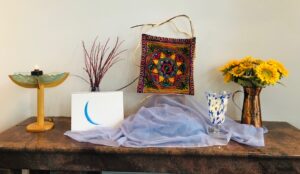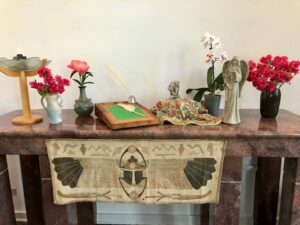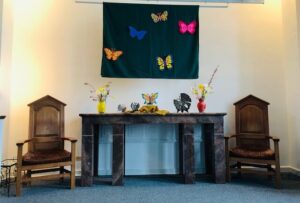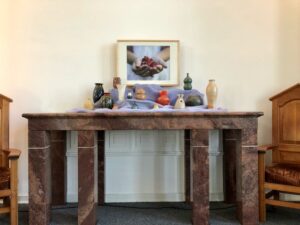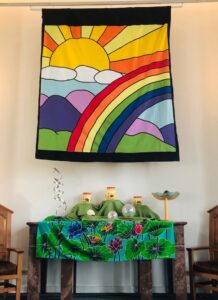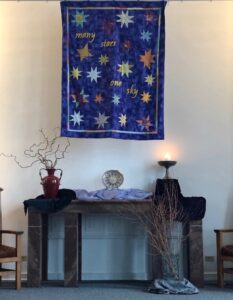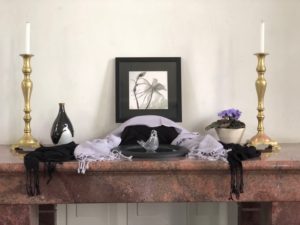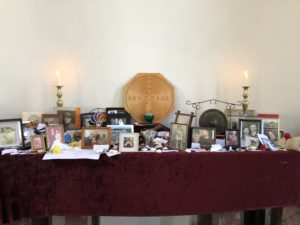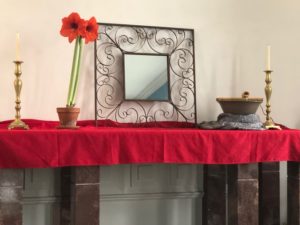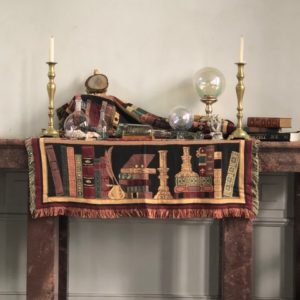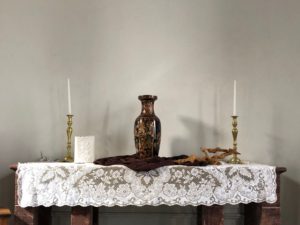Ringing the Chime
Greetings
Good morning, and welcome to Thomas Jefferson Memorial Church Unitarian Universalist. Ours is a congregation in the liberal religious tradition, and we welcome all who would work together to make this a world in which all are welcome. As a part of that welcome I would encourage each of us to do what we need to in order to be fully and authentically present. You might need to squirm a bit, or doodle on your Order of Service, or quietly knit, but be aware that the people around you have their own needs as well, so do try to balance yours and theirs. If what you need is a more quiet, less stimulating place to be, we have a Comfort Room out those back doors and to the right. The sound from the service is broadcast into the room, so you won’t miss anything. I am going to encourage all of us to take out our electronics at this time and set them to silent. You don’t need to turn them off – some people need to be able to connect to the outside world in order to be fully present – yet none of us wants to be that person whose phone breaks a powerful silence with its default ringtone.
I want to call your attention to three things this morning. First, I want to thank everyone who made last night’s auction the incredible time it was! Also, as this is the start of a new month we have a new art exhibit around us – these are the works of Susan Patrick And I want to welcome Törok Karöla, who is here visiting Charlottesville this weekend. Karola’s father, István, is the minister of our partner congregation in Gyepes, Transylvania. István, his wife Melinda, and Karola were all here 2013, and she has been back in the states this year as part of a fellowship. She’ll be in the Social Hall to greet friends old and new. Szia, Karola.
Finally, I want to say up front that this service will not be comfortable for all of us – me included. But I hope it won’t be, because if we can examine racism, really look deep into its foul maw, and especially if those of us who think of ourselves as white can do this honestly, and it isn’t uncomfortable, then we’re doing it wrong. Between last Sunday and this, over 600 Unitarian Universalist congregations around the country – and around the world – have been looking, deeply, at the issue of white supremacy, and not just how it operates “out there,” but how it is alive and all too well “in here” – within our Association, within our own congregations, and within our own souls. This morning we’ll be exploring it here in the sanctuary, and all of our children’s and youth’s religious education programming – except for OWL – will be looking at issues of racial justice in age appropriate ways as well.
If you identify as a person of color, I’d like you to know that there is a space for you to caucus with others who come to these issues from a different perspective than do those who look more or less like me. You are certainly more than welcome to stay here, of course, but the people who have developed the resources for this UU White Supremacy Teach-In realize that you may have unique needs. This safe caucus space – which is for people of color only – is downstairs in Lower Hall 3. I would say to anyone, however you identify, that there are people at the Racial Justice Committee table in the Social Hall with further resources for you, and that that’s a good place to go for further conversations. (And keep your eyes open to all the ways we communicate things, because in the coming weeks and months we will be offering other opportunities to continue to explore these issues.)
All that said, as always, it is good that you – you specifically, you particularly – are here this morning. Each of us brings something unique to this gathered community, so each of us is essential. It is good that we can be together.
Words of Welcome
Let us say together these words we say each week, words that describe the kind of community we strive to be:
Whoever you are, Whomever you love,
However you express your identity;
Whatever your situation in life,
Whatever your experience of the holy,
Your presence here is a gift.
Whether you are filled with sadness,
Overflowing with joy,
Needing to be alone with yourself,
Or eager to engage with others,
You have a place here.
We all have a place here.
We all are welcome here.
Prelude
Chalice Lighting
Please stand close together so your shoulders or arms are touching. Let’s read the chalice lighting together.
We are the Chalice.
I light the flame of justice in covenant with you.
We are the Chalice.
I light the flame of justice with my love.
We are the Chalice.
I light the flame of justice knowing I have much more to learn.
We are the Chalice.
I light the flame of justice with my hope.
We are the Chalice.
I light the flame of justice with my determination.
We are the Chalice.
I light the flame of justice supported by our Unitarian Universalist faith.
(written by Kate Fraleigh)
Opening Hymn: #119 Once to Every Soul and Nation
The original lyrics, “Once to every man and nation …,” were taken from a much longer poem by the white poet and abolitionist James Russel Lowell, titled, “The Present Crisis.” It’s a poem about the need to bring slavery to an end and for America to free itself from its past so that it could become what it was meant to be. The version we sing addresses the problem the poem’s gender-specific language, but after singing it one Sunday a parishioner suggested that the title should be changed again, this time to say, “Oft to every soul and nation.” This looks to be one of those times. It’s #119 in our grey hymnal.
First Reading
Our first reading is an excerpt from the Rev. Dr. Martin Luther King Jr.’s famous “Letter from Birmingham Jail.” While in jail, an ally of Dr. King’s smuggled in a newspaper which contained a piece titled, “A Call for Unity.” It was a statement made by eight white Alabama clergymen against King and his methods. The letter provoked King, and he began to write a response on the newspaper itself. King writes in Why We Can’t Wait: “Begun on the margins of the newspaper in which the statement appeared while I was in jail, the letter was continued on scraps of writing paper supplied by a friendly black trusty, and concluded on a pad my attorneys were eventually permitted to leave me.” In this section, he wrote:
“I must confess that over the past few years I have been gravely disappointed with the white moderate. I have almost reached the regrettable conclusion that the Negro’s great stumbling block in his stride toward freedom is not the White Citizen’s Counciler or the Ku Klux Klanner, but the white moderate, who is more devoted to “order” than to justice; who prefers a negative peace which is the absence of tension to a positive peace which is the presence of justice; who constantly says: “I agree with you in the goal you seek, but I cannot agree with your methods of direct action”; who paternalistically believes he can set the timetable for another man’s freedom; who lives by a mythical concept of time and who constantly advises the Negro to wait for a “more convenient season.” Shallow understanding from people of good will is more frustrating than absolute misunderstanding from people of ill will. Lukewarm acceptance is much more bewildering than outright rejection.
First Reflection – Establishing a Context
To those of us in this room who identify as, or are identified as, white, I encourage you to take a deep breath and to do what, at its best, our Unitarian Universalist faith calls on us to do – to open our minds to the possibility of encountering truth in ways, places, and forms we hadn’t expected, and to open our hearts to hear the voices of those who have different stories than the ones we know and tell. To those here who identify as people of color, I am grateful for both the support, as well as the suspicion, I expect you bring with you this morning.
I must say that I have rarely stepped into a pulpit with more trepidation than I do this one this morning. Stepping, blindfolded, onto an electrified tight rope strung over a minefield built on a quicksand pit seems more appealing right about now.
Some people are calling what’s been going on recently within our Unitarian Universalist Association an “upheaval,” an “implosion,” “chaos,” a “crisis.” I would note that most of the people who are saying these things are people who identify as, or who are identified as, white. It is, by and large, white Unitarian Universalists who are expressing fear at “what we’re doing to one another,” who are outraged that words like “white supremacy” and “Unitarian Universalism” are being uttered in the same breath, who are counseling taking care not to “push people away,” who are already talking about “healing” and “building bridges,” and who keep reminding anyone who will listen that the real fight is “out there.”
Black and brown Unitarian Universalists … not so much. At least those I know personally, and those I have some connection to – no matter how many degrees of separation – aren’t saying that stuff. None of this is some kind of shocking revelation to them; it’s been their lived experience. None of this is all that surprising, except, perhaps, surprise at just how surprised (and threatened) so many white UUs are. Oh, UUs of Color are expressing anger –that the things they’ve been saying for decades are being met with so much dismissive disbelief. And they are expressing fear, too, but it’s not so much the white fear that this is going to tear our Association apart. It’s the fear that once again what looks like a possibility for a real awakening, for real change, is going to – once again – turn back on itself and renew the slumbering status quo that is required by the dominant, white supremacist culture.
But let’s take a look at those words, those two words – white supremacy. They’ve seemingly become the magnet, drawing to them all the anger, guilt, fear, denial, rage, disorientation, and discomfort that go along with any honest examination of race in this country. People are saying – the vast majority of them white people – that those words just aren’t appropriate to use to describe us. Those words, people are saying (the vast majority of them white people) are too divisive, too inflammatory. A lot of white UUs are saying that the insistence on using those words, those particular words, is going to tear us apart and spell the end of Unitarian Universalism as we know and love it. To this last point, my dear friend Aisha Hauser has said (and this is in your Order of Service), “If the words “white supremacy” – that accurately describe the water in which we swim – are going to be the reason that Unitarian Universalism will fall apart, I invite you to think about what exactly is holding us together.”
One of the things we know without question about the way racism works – beyond, of course, the conscious and intentional racist acts of individuals and groups – is that it creates a system, a culture which makes white perspectives, and white attitudes, and white experience, central and normative. We know, incontrovertibly, that one of the ways racism works is to subtly, and not so subtly, conflate “white” with “normal” … with “human.” It makes it so that we – both whites and people of color, too – come to believe, even without realizing it, that the assumptions white folks have about the way things are and the ways things are supposed to be – based on what we’ve been taught and on our own experiences – are true, are reality. (The white anti-racist author and speaker Tim Wise has said that one piece of white privilege is the ability to define reality and have that definition stick.)
The white scholar of comparative mythology, Joseph Campbell, famously said that the stories other cultures tell about how the world works are called “Myths;” the stories our culture tells about the way the world works are called, “The Way The World Works.” On my door there is a poster with a quote from the white anthropologist Wade Davis which says, “The world in which you were born is just one model of reality. Other cultures are not failed attempts at being you …” To me, these two are helpful here, because one of the ways the culture of white supremacy perpetuates itself is to try to convince us –all of us – that its racist assumptions and assertions are simply “The Way The World Works,” and that anything – any practice, any perspective, any perception – anything at any variance from that is simply “a failed attempt at being [normal],” (where “normal” is defined – even unconsciously – as being synonymous with “white”).
None of this is new. For more than a decade we’ve offered workshops and classes, book studies and discussions, film series, and my predecessors in this pulpit and I have preached on it all frequently. But it’s hard to hear. It’s hard to understand. I know, because no matter how many times I hear it, no matter how many times I say it, I know that Ican’t yet – hopefully, “yet” – fully grasp it. Because it is only natural for me to think, for you to think, for any of us to think that the world as we’ve seen it, and experienced it, and known it is the way things are. Yet this analysis of white supremacy culture is that we – we all, to some extent, but particularly the “we” who identify as, or are identified as, white – we have to not only understand with our minds, but fully and deeply realize with all of our senses and the very fiber of our beings, that “the world in which [we] were born is just one model of reality.” “Up” is not necessarily “up” just because that’s how we’ve always experienced it to be. “Down” is not always “down.” “Fair” and “right” are not always “fair” and “right.” And it doesn’t matter how well-meaning, and good-hearted, and liberal we are. How “woke.” Because the culture of white supremacy doesn’t care about how well-meaning, and good-hearted, and liberal we are; it cares only that “whiteness” – and all things “white” – remain regarded as supreme.
And really, the words “white supremacy” are no more – and no less – judgmental than “systemic racism.” To say that our own beloved Unitarian Universalist Association, even our own beloved TJMC, participates in and perpetuates the culture of white supremacy is no more of a condemnation that it is to say that they are as infected by systemic racism as is everything else in the United States. How could it be otherwise? As Aisha put it, and others besides her, it’s “the water we swim in.” The culture of racism, the culture of white supremacy, is the air we breathe. It’s in the very DNA of everything – and everyone – whether we want it to be or not, whether we’re aware of it or not, whether we are consciously working towards its eradication or not. To deny this is like denying climate change – it has simply been much to clearly established to be argued with. It simply is true.
So what are we going to do about it? And in this case the “we” I’m talking about, and to, is primarily the “we” who identify as, or are identified as, white. What are we – we white UUs – going to do about having been clearly, forcefully, unambiguously shown that the institutional containers of the faith of Unitarian Universalism – the Association and its congregations – are part of, participate in, and perpetuate the systems and structures – the culture– which keeps “whiteness” supreme … what are we going to do about it?
We could argue about what words to use. We could argue about the “strategy” being employed to call for this examination. We could blame the people who have been, and continue to be, hurt by the systems, and structures, and practices of the UUA for daring to speak of it out-loud and demanding to be taken seriously. We could condemn those who are calling for change, who are, as we put it here, “lovingly calling each other back into covenant when we have fallen short.” (Even though that love is decidedly “tough love.”)
All of these things have been happening, with a vehemence and an ugliness that most of you might not believe and that I find exceedingly more disturbing than any declaration that the UUA is a white supremacist institution. (This morning I saw a graphic a Unitarian Universalist made that puts the flaming chalice over a rainbow … confederate battle flag. A Unitarian Universalist did that!) We could respond in any of these ways – and we are – but are these the ways we are called to behave by the Unitarian Universalist faith which these institutions exist to support? I don’t think so.
I’m not sure who said this first, but I know it was a UU of Color (and I’m paraphrasing here): Instead of arguing over what words to use, why not ask what pain caused someone to feel the need to use them? Can we who identify as, or are identified as, white step out of our own assumptions about how things are to listen to, and really hear, what’s being said by UUs of Color whose experiences are not “failed attempts” at being us, at being … white and all that that means? Are we willing to not only recognize – but really believe – that our “up” is not the only “up,” and that our “down” is not the only “down,” and that our “fair” and “right” is not the only “fair” and “right? And that, in fact, our “fair” and “right” might actually be “unfair” and “wrong.” If we are willing to try to do that, we need to know that wewill be changed. We will have to let go of things, even things we take for granted … even things we love. But we simply have to be willing to be changed, if our society is ever to be transformed into Beloved Community we dream about.
Musical Response: #127 “Can I See Another’s Woe?”
The words to this hymn are from a longer poem by the white poet William Blake, titled, “On Another’s Woe” from his book Songs of Innocence. It’s #127 in our grey hymnal.
Second Reading
The author of the piece we’re about to hear self-identifies as Vietnamese American … and Unitarian Universalist. This is, “Dear Liberal Allies,” by Trungles
Dear Liberal Allies,
You and I learned very different things in very different ways. If you didn’t live an experience, then step aside.
We students of color, gay students, trans* students, children of immigrants and refugees
knew this stuff before our professors told us what to call it. We learned it from the bottom up.
You learned it another way. You received a set of key words and a list of definitions. Your learning was, in all likelihood, “Here is this word. This is what this word means.”
For you, it was “Xenophobia: a strong fear or dislike of people from other countries.”
For us, it was “Xenophobia: the time that boy in my kindergarten class spat on me because I couldn’t speak English yet. Or when I saw that clerk yell at my mom in the grocery store because her English wasn’t clear enough.”
For you, it was, “Racism: unfair treatment of people who belong to another race; violent behavior towards them.”
For us, it was, “Racism: that one time I saw that manager tell that sales girl to follow my dad around at Kohl’s. Or that one time my neighbor’s kid got shot by the police and they tried to cover it up by convincing everyone he was in a gang because he was Hmong, but we knew he wasn’t. Or the time my dad told me I shouldn’t rollerblade to the library because I’m not white and it’s not safe for me.”
For you, it was, “Homophobia: a strong dislike or fear of homosexual people.”
For us, it was, “Homophobia: that time in the sixth grade when Ryan shoved me against a glass door and banged my face in it while yelling, ‘faggot!’ at me until the teacher stopped him. Or when my Catholic high school’s president told me that, though he loved me as a child of God, he still believed I was sinful.”
For you, it was: “Classism: prejudice or discrimination based on social class.”
For us, it was: “Classism: the time when my best friend came over to hang out and her parents didn’t want her to come over again because they didn’t like our neighborhood. Or that one time when my friends had no idea what food stamps looked like and I was too embarrassed to explain what they were.”
So while you were learning that these academically-framed phenomena were real problems, we were getting figurative nametags for awful things that we already knew. Your weekly vocabulary list was, to us, just a hollow shadow of our lived experiences.
When you step out of class, you get to say, “Oh, awesome. I’m learning how to be a good ally and a better human being. This will help me.” For us, it’s more like, “Ah, so that’s what they’re calling it nowadays. When exactly did they say change was going to come for us?”
A Time of Silence
Let us take a moment of silence – to sit with what we’ve heard; to be with what we’re feeling; to sink into the realization that what we see, what we know to be true, is not as true as we believe; and to seek the courage to risk losing some of who we’ve been to become who we need to be.
Musical Response: Woke Up This Morning With My Mind Stayed on Freedom
Reverend Osby of Aurora, Illinois created this revamp of an old gospel song “I woke up this morning with my mind stayed on Jesus” while spending time in Hinds County jail during the freedom rides. The song spread and became part of the civil rights movement as did many others during the time, this song being one of the more notable pieces. I hope that even as a predominantly white congregation we can hear in it what People of Color must hear, and sing it in honor of their struggles.
Offering
One of the gifts of our Unitarian Universalist faith — and of this particular Unitarian Universalist community — is that it calls on all of us to grapple with the truth of life, even when it’s unpleasant, even when it hurts, even when we’d rather not. But at its best, ours is not a faith that turns its back on “inconvenient truths,” nor does it give up and walks out when we disagree. We are called on to persist in the free and responsible search for truth, even when it’s hard … even when we don’t like what we find. To support this kind of deep and challenging faith, the ushers will take a financial offering.
Third Reading
Our third reading is from “The Uses of Anger: Women Respond to Racism,” the keynote presentation Audre Lorde delivered at the National Women’s Studies Association Conference in 1981:
Women of Color in America have grown up within a symphony of anger at being silenced at being unchosen, at knowing that when we survive, it is in spite of a world that takes for granted our lack of humanness, and which hates our very existence outside of its service. And I say symphony rather than cacophony because we have had to learn to orchestrate those furies so that they do not tear us apart. We have had to learn to move through them and use them for strength and force and insight within our daily lives. Those of us who did not learn this difficult lesson did not survive. And part of my anger is always libation for my fallen sisters.
Anger is an appropriate reaction to racist attitudes, as is fury when the actions arising from those attitudes do not change. […]
I cannot hide my anger to spare you guilt, nor hurt feelings, nor answering anger; for to do so insults and trivializes all our efforts. Guilt is not a response to anger; it is a response to one’s own actions or lack of action. If it leads to change then it can be useful, since it is then no longer guilt but the beginning of knowledge. Yet all too often, guilt is just another name for impotence, for defensiveness destructive of communication; it becomes a device to protect ignorance and the continuation of things the way they are, the ultimate protection for changelessness.
[…]I have no creative use for guilt, yours or my own. Guilt is only another way of avoiding informed action, of buying time out of the pressing need to make clear choices, out of the approaching storm that can feed the earth as well as bend the trees. If I speak to you in anger, at least I have spoken to you: I have not put a gun to your head and shot you down in the street; I have not looked at your bleeding sister’s body and asked, “What did she do to deserve it?” […]
My response to racism is anger. That anger has eaten clefts into my living only when it remained unspoken, useless to anyone. It has also served me in classrooms without light or learning, where the work and history of Black women was less than a vapor. It has served me as fire in the ice zone of uncomprehending eyes of white women who see in my experience and the experience of my people only new reasons for fear or guilt. And my anger is no excuse for not dealing with your blindness, no reason to withdraw from the results of your own actions.”
Third Reflection: Listening Even When We Don’t Want to Hear
“I cannot hide my anger to spare you guilt, nor hurt feelings, nor answering anger; for to do so insults and trivializes all our efforts. […] my anger is no excuse for not dealing with your blindness, no reason to withdraw from the results of your own actions.”
I have a confession – I really don’t like this. I am genetically pre-conditioned to try to avoid conflict, and in all of this there’s a whole lot of conflict going on, with a whole lot more to come. People are feeling ignored, disbelieved, dismissed (both in this moment and for decades, centuries). People are feeling attacked, and rejected, and misunderstood. There’s rage, and guilt, and blame, and fear, and all of it makes me want to run to the hills. And hearing myself and this faith tradition that I love spoken of in the same sentence as the words “white supremacy” makes my skin itch and burn.
But as a white, heterosexual, able-bodied, cisgender male, with a comfortable income, and a whole lot of education I don’t have the luxury of running away. I mean I do – that’s part of the privilege that comes with all those identities I just named. I have the freedom to do that, but I don’t want to. No matter how much I want to, I don’t want to, because I know that absolutely nothing is going to change if I do.
That’s not even it, because sure, things might change … a bit … here and there. But as I said in my Bulletin column last month, if there is ever going to be an end to racism (and sexism, and heterosexism, and ableism, and classism, and all the other “isms” that are used to oppress), if these forms of oppression are ever going to end, there needs to be more than just change, but fundamental transformation. And I know that I need to give up some of the privileges that I’ve become accustomed to, that I take for granted, that I never even used to be aware of, because whenever I take advantage of those privileges, I become even more complicit in the continuation of those very things I claim to want to end.
And I know that I have to give up my assumption that whatever we do, however we go about doing it, I have to understand the approach and be comfortable with it. I have to let go of my predisposition toward insisting that I get to approve the words we use, and the actions we take, and the timing of it all. That I believe – as a white, heterosexual, able-bodied, cisgender male, with a comfortable income, and a whole lot of education – that I get to call all these shots is yet another one of those privileges that I have to reject.
In Dr. King’s “Letter from Birmingham Jail” he castigates those white clergymen – and through them all those “white moderates” of “good will” he despairs of – for thinking that they get to determine the strategy. He wrote,
Frankly, I have yet to engage in a direct action campaign that was “well timed” in the view of those who have not suffered unduly from the disease of segregation. For years now I have heard the word “Wait!” It rings in the ear of every Negro with piercing familiarity. This “Wait” has almost always meant “Never.”
To their criticism of the strategy of non-violent action as being too confrontational, too inflammatory, too likely to cause possible allies to turn against the movement, he wrote,
Nonviolent direct action seeks to create such a crisis and foster such a tension that a community […] is forced to confront the issue. It seeks so to dramatize the issue that it can no longer be ignored. My citing the creation of tension as part of the work of the nonviolent resister may sound rather shocking. But I must confess that I am not afraid of the word “tension.” I have earnestly opposed violent tension, but there is a type of constructive, nonviolent tension which is necessary for growth. […] [W]e see the need for nonviolent gadflies to create the kind of tension in society that will help [people] rise from the dark depths of prejudice and racism to the majestic heights of understanding and [kinship].
That is why I said at the outset that I hope this won’t be comfortable for those of us who see ourselves as white. I can’t help but see parallels, parallels between those calls for patience, for dialing back the tension, for reducing the feelings of confrontation, and those same calls today. I can’t help but see parallels. I’m hoping that you can’t either.
I pray, I pray that we white UUs – however uncomfortable we feel, however hurt we feel, however guilty we feel, however angry we feel, however we feel – I pray that we will stay with all that discomfort and keep working toward what we say we want. I pray that we will not give up, not turn back, not go back to sleep, not absolve ourselves, not make this about us, and that we not fail the call of justice as we have done throughout our history.
Candles of Hope & Remembrance and the Sands of Forgiveness & Atonement
A Moment of Prayer (spoken and silent)
Great and Gracious Spirit – God, to some; Spirit of Life and Love, to others; Call of Justice to yet still more: This is hard. Being uncomfortable is hard. Being hurt is hard. Being ignored, and disbelieved, and accused, and judged is hard. Change is hard. And transformation is harder. Yet this is the work that Justice, that Love, that Life, that God calls us to – for our world is not yet the Beloved Community we’ve dreamt of for so long, the Beloved Community in which everyone is welcome, in which everyone is free, in which everyone is encouraged and ennobled, in which everyone can flourish. So we pray for the humility to hear hard truths; we pray for the courage to speak those truths; and we pray for the strength to let ourselves be changed by them, for only with these can we join those who, from the beginning of time, have struggled for liberation of all.
And now, given that there are so many ways of naming and knowing the sacred and the holy, let us each, according to our own understandings and our own traditions, take a moment of silence open our hearts […]
In the name of all that is holy, and in all the Holy Names we have ever known, and those we have never yet allowed ourselves to hear, and today, in the most holy name of Liberation, we say, Blessed be, Namaste, Asalaam Alikum, Ashé, Shalom, and Amen.
Parting Words
For our Parting Words we return again to the Rev. Dr. King’s “Letter from Birmingham Jail.”
Lamentably, it is an historical fact that privileged groups seldom give up their privileges voluntarily. Individuals may see the moral light and voluntarily give up their unjust posture; but, as Reinhold Niebur has reminded us, groups tend to be more immoral than individuals.
We know through painful experience that freedom is never given by the oppressor; it must be demanded by the oppressed. […] [And] we who engage in nonviolent direct action are not the creators of tension. We merely bring to the surface the hidden tension that is already alive. We bring it out in the open, where it can be seen and dealt with.
And the question for us – all of us – here and throughout our Association is, how are we going to deal with it?
Closing Hymn: We Are Building Up A New World
Dr. Vincent Harding, who was a friend and advisor of Dr. King’s, and wrote Dr. King’s ‘Vietnam’ speech delivered on April 4, 1967, was a legend and a mentor to so many folks worldwide, and especially in the city of Denver.
In Denver circles, he is widely credited with spreading the song “We Are Building Up A New World,” sung to the tune of “We Are Climbing Jacob’s Ladder,” and it’s used often at activist and spiritual events:
We are building up a new world
We are building up a new world
We are building up a new world
Builders must be strong.
Courage, sisters, don’t get weary
Courage, brothers, don’t get weary
Courage, people, don’t get weary
Though the way be long.
We are building up a new world
We are building up a new world
We are building up a new world
Builders must be strong.
Benediction
Postlude

